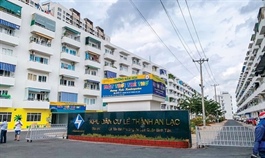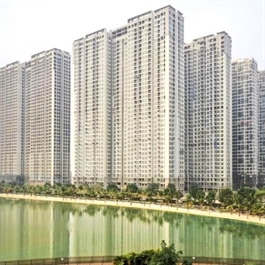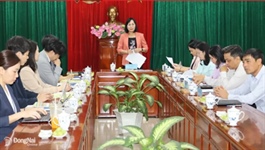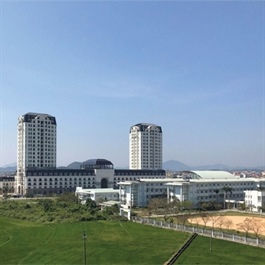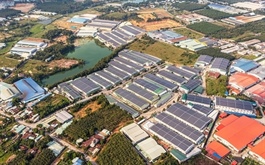More attention likely in housing ownership
More attention likely in housing ownership
The National Assembly passed a new Law on Housing and new Law on Real Estate Business last November. Anh Le, managing partner at DN Legal, analyses a number of legal changes related to housing ownership of foreigners in Vietnam.

The new Law on Housing (LoH) and Law on Real Estate Business (LoREB) are set to come into effect in 2025, along with their respective implementing decrees and circulars, which are currently being drafted and will replace the current Law on Housing 2014 and Law on Real Estate Trading 2014.
These legislative changes are aimed at revitalising the real estate market and attracting increased foreign investment, following a period of instability.
There are key provisions concerning the ownership of houses by foreigners in Vietnam. Under the new LoH, eligible foreigners can acquire houses directly from other foreigners possessing properties in Vietnam, a right which was not expressly recognised under the current LoH.
Under the existing LoH, foreigners’ ownership rights can be reflected in the respective certificate of land use right, housing ownership, and other assets attached to land for houses acquired via investing in real estate projects, direct purchases with real estate project developers, and gifts or inheritance.
Each developer can only allocate a specific number of its housing products in each project to foreign buyers. This limitation encompasses a maximum of 30 per cent for apartments and a maximum of 250 landed houses within a commune/ward boundary.
Thus, if a foreigner wishes to acquire a house in a real estate project from a fellow foreigner or a local individual, the notary office which notarises the transfer agreement often requires pre-approval or confirmation from the developers acknowledging that such transfer is within such quota limit. A limited number of notary offices still proceed to notarise foreigner-to-foreigner transfer, though this is more of a practice note than legislatively allowed. These factors have led to complex procedures in the secondary market for housing products.
The new LoH explicitly recognises that foreigners can sell and buy homes to and from fellow foreigners. This clear legal framework governing the secondary market is anticipated to draw attention from foreign investors towards the housing market, particularly those who seek investment opportunities without the intention of owning properties in Vietnam.
Explicit regulations
The current LoREB does not regulate on any deposit amount for off-plan housing purchase, whereas the new law regulates that the first deposit shall not exceed 5 per cent of the purchase price of such housing and only be collected after the project is granted written approval and the sale permit. This is a blanket clause that applies to foreign and local purchasers alike.
As a practical note, since the current LoREB does not regulate the collection of deposits, deposits of off-plan housing are often collected at a maximum of 30 per cent and before such housing is qualified for a sale permit. Other than the deposit requirement, other regulations on money collection remain the same under the new LoREB.
While we acknowledge that the new deposit mechanism imposes stricter conditions on the developers, particularly in managing funding for project development, we believe these regulations favour buyers. They serve as safeguards against unqualified developers, ensuring timely handover of houses and minimising the risk of misappropriation of funds. These factors contribute to establishing a transparent legal environment that assures foreigners in their decision to purchase and own housing in Vietnam.
Given that a developer will constantly be in need of mobilised capital before the sale permit is acquired, we will have to watch this space and see if new methods of money collections will be devised by developers, such as in the form of reservation agreement, or promise to buy agreement.
Under the current and new LoH alike, eligible foreigners may only acquire houses in areas which are not subject to national security and defence criteria, determined by the Ministry of Defence and the Ministry of Public Security. The new LoH further requires the government to provide detail guidelines on criteria of national defence areas, which allow the relevant ministry to produce such a list for publication.
Currently, since there are limited guidelines on determining these areas, the relevant ministries are unable to produce a list, which means hundreds of foreign investors are unable to recognise their ownership of housing on the relevant land use rights certificate. As a bandage solution to the issue under the current LoH, practice varies for different provinces authorities.
Hanoi strictly follows the regulations and issues a specific list of defence-sensitive areas, whereas locations like Haiphong opt to state such eligibility in the sale permit issued to specific projects. Meanwhile, Ho Chi Minh City has not published a comprehensive list of defence-sensitive areas, instead requiring developers to independently assess whether their projects meet the criteria and report to the city’s People’s Committee and Department of Construction. Upon approval from these authorities, developers can proceed to sell the housing to foreigners.
With the new LoH and guiding decree, we hope to see clear demarcation from the state on defence-sensitive areas, which will assist foreigners in determining the licensing requirements applied for issuance of land use rights certificates.
Renewals, gifts, and more
Under the current LoH, foreigners’ right to renew housing tenure is subject to authority discretion. Meanwhile, the new LoH explicitly states that foreigners may extend their housing ownership for a maximum 50 years. Whilst the change is nominal, we anticipate it will open the door to specific guidelines on extension procedures and criteria in supplementing decrees.
The new LoH clarifies the rights and procedures of settlement where foreigners are gifted or inherit a house but are not eligible to be granted a land use rights certificate. Eligible foreigners will be issued a certificate, whereas ineligible ones can authorise another individual to sell the house to eligible individuals and receive the transfer price of such. This point is silent under the current LoH.
Eligible foreigners are those that qualify for a set of requirements under the current LoH supplementing decree and under other conditions, such as being allowed to enter Vietnam.
During the travel bans through the recent pandemic, we observed difficulties in foreigners receiving inheritance. There were also no guidelines to authorise Vietnamese individuals to sell such properties on their behalf.
With the new LoH, we anticipate an increased confidence for individual foreigners to invest in Vietnam.
Meanwhile, the new LoREB distinguishes between a Vietnamese person with dual citizenship and an overseas Vietnamese person holding only a foreign passport. Particularly, Vietnamese individuals with dual citizenship have the right to purchase houses for sale, lease, or lease-purchase, whereas this right is not extended to overseas Vietnamese holding foreign passports.
However, investors should attempt to stay updated with the latest developments in Vietnam and seek case-specific advice from qualified legal professionals for investment opportunities.









